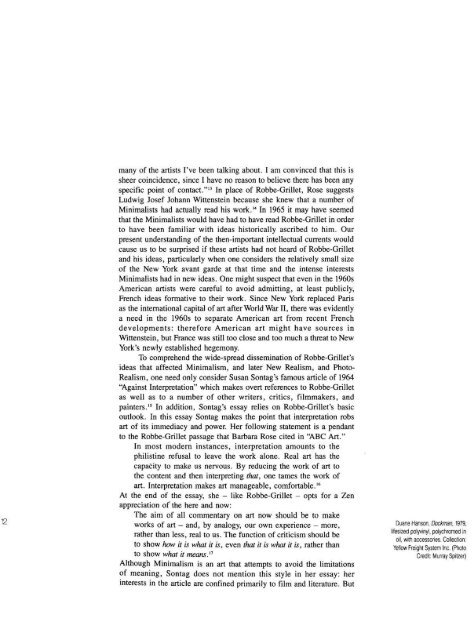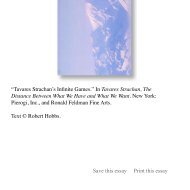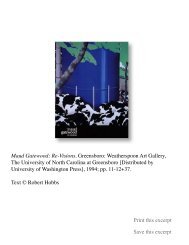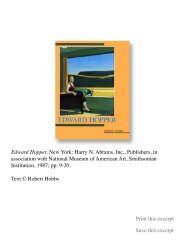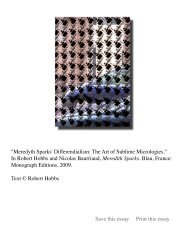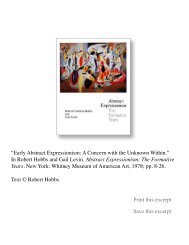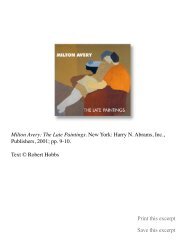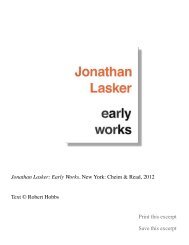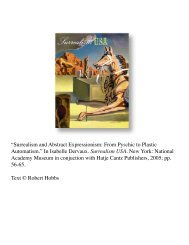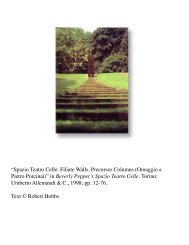Duane Hanson: The New Objectivity. Tallahassee - Robert Hobbs
Duane Hanson: The New Objectivity. Tallahassee - Robert Hobbs
Duane Hanson: The New Objectivity. Tallahassee - Robert Hobbs
You also want an ePaper? Increase the reach of your titles
YUMPU automatically turns print PDFs into web optimized ePapers that Google loves.
many of the artists I've been talking about. I am convinced that this is<br />
sheer coincidence, since I have no reason to believe there has been any<br />
specific point of contact." 13 In place of Robbe-Grillet, Rose suggests<br />
Ludwig Josef Johann Wittenstein because she knew that a number of<br />
Minimalists had actually read his work.'• In 1965 it may have seemed<br />
that the Minimalists would have had to have read Robbe-Grillet in order<br />
to have been familiar with ideas historically ascribed to him. Our<br />
present understanding of the then-important intellectual currents would<br />
cause us to be surprised if these artists had not heard of Robbe-Grillet<br />
and his ideas, particularly when one considers the relatively small size<br />
of the <strong>New</strong> York avant garde at that time and the intense interests<br />
Minimalists had in new ideas. One might suspect that even in the 1960s<br />
American artists were careful to avoid admitting, at least publicly,<br />
French ideas formative to their work. Since <strong>New</strong> York replaced Paris<br />
as the international capital of art after World War II, there was evidently<br />
a need in the 1960s to separate American art from recent French<br />
developments: therefore American art might have sources in<br />
Wittenstein, but France was still too close and too much a threat to <strong>New</strong><br />
York's newly established hegemony.<br />
To comprehend the wide-spread dissemination of Robbe-Grillet's<br />
ideas that affected Minimalism, and later <strong>New</strong> Realism, and Photo<br />
Realism, one need only consider Susan Sontag's famous article of 1964<br />
"Against Interpretation" which makes overt references to Robbe-Grillet<br />
as well as to a number of other writers, critics, filmmakers, and<br />
painters.' 5 In addition, Sontag's essay relies on Robbe-Grillet's basic<br />
outlook. In this essay Sontag makes the point that interpretation robs<br />
art of its immediacy and power. Her following statement is a pendant<br />
to the Robbe-Grillet passage that Barbara Rose cited in '~BC Art."<br />
In most modern instances, interpretation amounts to the<br />
philistine refusal to leave the work alone. Real art has the<br />
capacity to make us nervous. By reducing the work of art to<br />
the content and then interpreting that, one tames the work of<br />
art. Interpretation makes art manageable, comfortable.'•<br />
At the end of the essay, she - like Robbe-Grillet - opts for a Zen<br />
appreciation of the here and now:<br />
<strong>The</strong> aim of all commentary on art now should be to make<br />
works of art - and, by analogy, our own experience - more,<br />
rather than less, real to us. <strong>The</strong> function of criticism should be<br />
to show how it is what it is, even that it is what it is, rather than<br />
to show what it means. 17<br />
Although Minimalism is an art that attempts to avoid the limitations<br />
of meaning, Sontag does not mention this style in her essay: her<br />
interests in the article are confined primarily to film and literature. But<br />
<strong>Duane</strong> <strong>Hanson</strong>, Dockman, 1979,<br />
lifesized polyvinyl, polychromed in<br />
oil, with accessories. Collection:<br />
Yellow Freight System Inc. (Photo<br />
Credit: Murray Spitzer)


